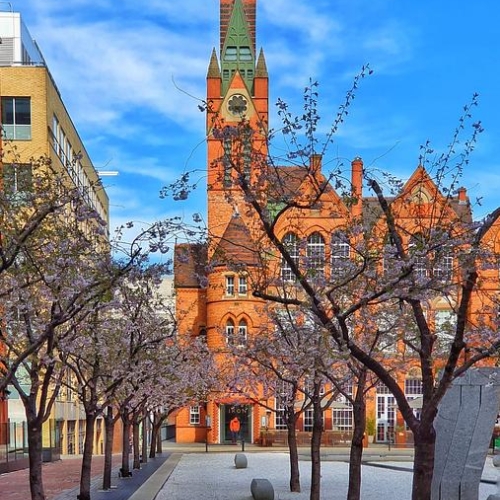Birmingham is Britain’s second largest city nestled in the heart of the West Midlands.
It has a rich tapestry of diversity, with over one hundred spoken languages, and is often referred to as Europe’s youngest city with over 40 per cent of the population being under 25.
With an extensive bus, tram and train network it’s easy to travel around Birmingham, as well as being well connected to travel to 90% of the UK in under four hours.
The city has also been significantly redeveloped in recent years, with the city centre being transformed to reveal it’s beautiful historic buildings, as well as brand new landmarks such as Birmingham Library.
Birmingham is known for being a global centre for industry, business and commerce, and therefore offers a wealth of opportunities for public sector, and private careers.
Birmingham will also be host to the commonwealth games during the summer of 2022, which will further bolster and amplify the fantastic destination that it is.

As well as being a fantastic destination for socialising, working and living, Birmingham is home to world class healthcare.
Many of our healthcare providers are at the cutting edge of world-class medical technology and involve leading practitioners and students from internationally renowned medical facilities including the University of Birmingham, Birmingham’s Woman’s Hospital, Birmingham Children’s Hospital.
It also boasts the Queen Elizabeth Hospital Birmingham; the city's first new acute hospital for 70 years. The new Queen Elizabeth Hospital Birmingham represents a £545 million investment in the health services for Birmingham and the Midlands, part of university Hospitals Birmingham NHS Foundation Trust – one of the largest Trusts in the country.
We are also fortunate to have the brand new Birmingham Dental Hospital & School of Dentistry, recently open, providing a fitting environment from which to deliver internationally recognised clinical services, education and research.
There are also 164 GP practices within Birmingham and Solihull, providing care services as the first point of contact in the healthcare system; acting as the ‘front door’ of the NHS. We also have 33 Primary Care Networks; which are groups of practices in local areas working together to provide a range of services to their local populations of 30-50k people.
